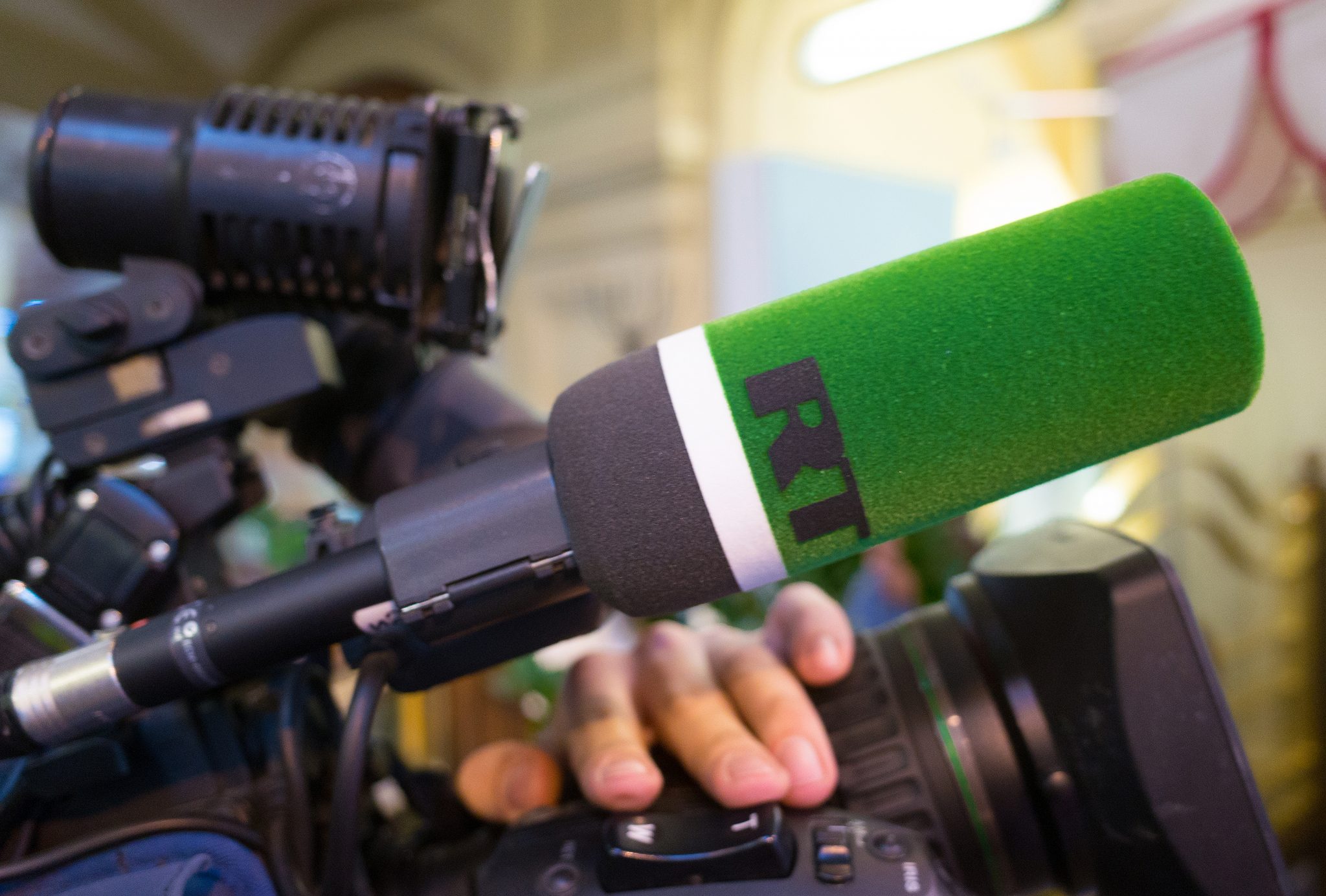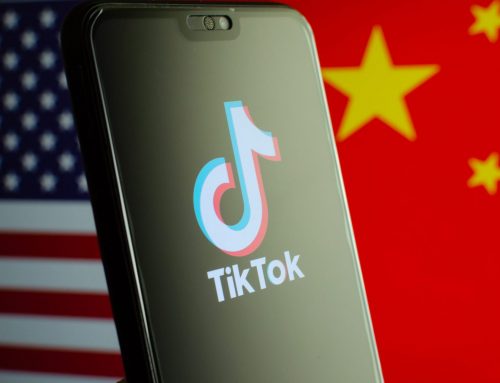Overview
Besides the ubiquitous coverage of the coronavirus, Russia, China, and Iran’s state media and government messengers last week hit on familiar themes for each of their respective countries. For Russia, that meant elevating claims of “Russophobia” in relation both to The New York Times’ reporting on U.S. intelligence’s conclusion that Russian military intelligence offered bounties to the Taliban to kill coalition troops in Afghanistan, as well as Latvia’s decision to ban seven RT channels from its airwaves. For China, that meant warnings to adversaries challenging the party state—whether in the context of foreign criticism over Hong Kong’s new national security law or the Indian government’s decision to ban 59 Chinese apps from the Indian market. And for Iran, that meant a continuation of the near-constant drumbeat of criticism directed at the United States, this time in the form of #AmericanHumanRightsWeek, a hashtag campaign aimed at highlighting alleged American injustices at home and abroad.
Russia Toplines
Last week, Russian officials and state-funded media sought to dismiss reports of Russian military intelligence (GRU) offering bounties to the Taliban to attack coalition forces in Afghanistan. The main thrusts in this effort were the elevation of voices casting doubt on the intelligence itself, Russian officials’ blanket denials, and attacks on the credibility of The New York Times, which broke the story. A smaller amount of content alleged that the story was “fake news” propaganda planted by the CIA. On other topics, state-funded media and diplomats re-upped claims of censorship in the West following Latvia’s decision to ban seven RT channels from broadcasting in the country, while coverage of the Russian constitutional amendments vote mainly featured basic updates.
China Toplines
In an expected but significant development, Beijing’s new national security law for Hong Kong passed on June 30. As a result, China’s diplomats and state media spent the following days defending the legislation and attacking the reactions of foreign officials who dared to voice their disapproval. Oscillating between appeals to reason, proud defiance, and veiled threats, Chinese government messengers deployed a vast array of arguments in favor of the national security law. However, Hong Kong and its defenders were not the only target of Beijing’s ire last week, as India’s decision to ban 59 Chinese apps from its market triggered a chorus of condemnation from diplomatic and state media sources monitored on Hamilton.
Iran Toplines
Iranian media outlets pushed a number of familiar narratives last week, including criticism of American diplomacy around the Iran nuclear deal and charges of racism and injustice in American society. They also played up cooperation among American adversaries while sharply criticizing American partners, especially Israel. Supreme Leader Ayatollah Khamenei was particularly active on Twitter last week, pontificating on subjects as diverse as the removal of Confederate statues in the United States, the “maximum pressure” campaign against Iran, American involvement in Latin American coups, and the Arab-Israeli conflict.
Top Accounts
Russian, Chinese, and Iranian state-funded media and government and diplomatic corps accounts:
Top 10 Accounts by Tweets, Likes, and Retweets — June 27-July 3:
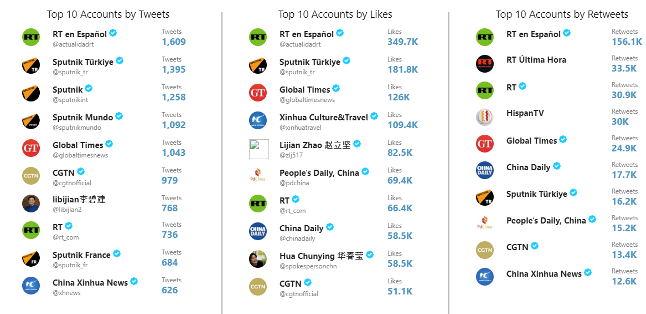
Top Hashtags
Russian, Chinese, and Iranian state-funded media and government and diplomatic corps accounts:
Top 10 Hashtags — June 27-July 3:
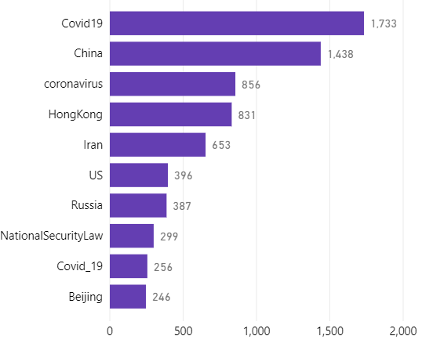
Top Countries Mentioned:
Top 10 countries mentioned by Russian, Chinese, and Iranian messengers on Twitter, YouTube broadcasts, and state-sponsored websites — June 27-July 3 (NOTE: there is no broadcast data for Iran):
Twitter Mentions:
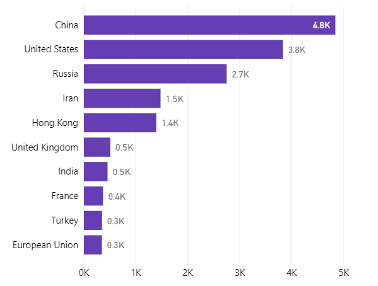
Broadcast Mentions:
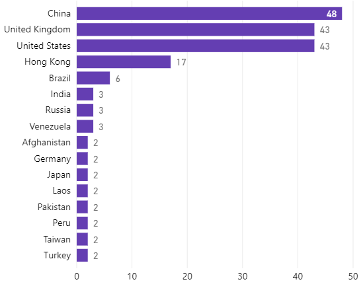
Website Mentions:
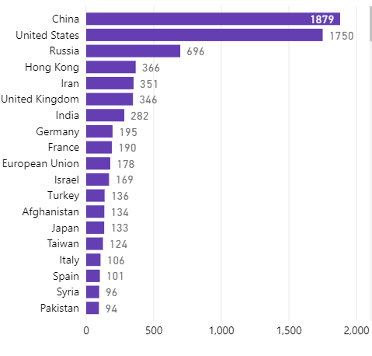
Russia
Russia Pushes Back on Afghan Bounty Allegations
As anticipated, Russian officials and state-funded media moved to dismiss reports that Russian military intelligence (GRU) offered cash bounties that rewarded the Taliban for attacks on coalition forces in Afghanistan. This effort concentrated on comments from two main sources. First, outlets elevated voices casting doubt on the intelligence itself and criticizing leaks, in particular statements made by current and former U.S. government officials:
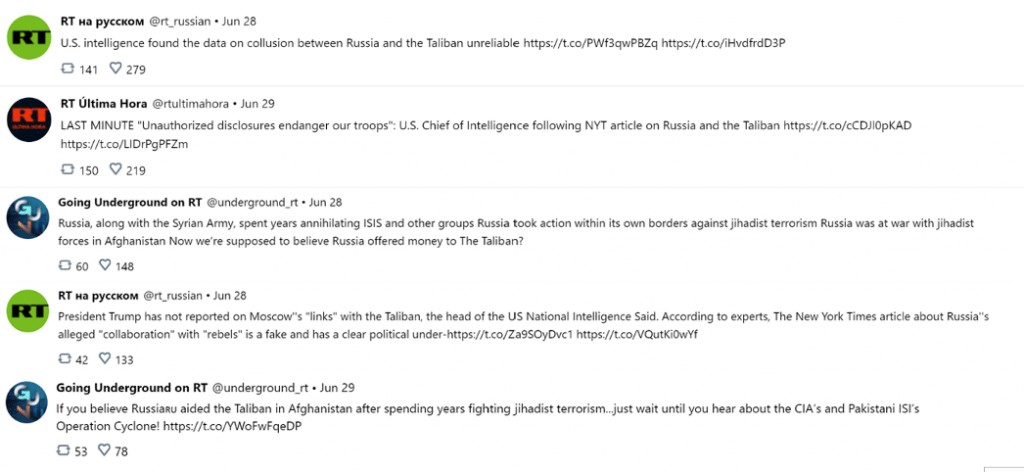
“Trump & Pence never briefed on ‘Russian bounties for Taliban’, NYT story ‘inaccurate’ – US intelligence chief,” RT, June 28, 2020.
“The US director of national intelligence has distanced himself from an NYT report claiming Russia paid money to the Taliban for killing US soldiers in Afghanistan. He said the White House was never briefed on the matter. The claim published by the New York Times is, like many such stories, based on anonymous intelligence sources.”
“WH spokeswoman says ‘no intelligence consensus’ on Russia bounty story, tells NYT & WaPo to ‘return Pulitzers’ for misreporting,” RT, June 29, 2020.
“The New York Times and the Washington Post should give up their journalistic accolades for selling rumors as scoops, the White House’s Kayleigh McEnany said, pointing at holes in their story about Russian bounties for the Taliban. The secretary has unleashed a scathing rebuke at the media, accusing the Times and the WaPo of peddling scandalous speculations about US President Donald Trump allegedly doing nothing after having been briefed about Russia paying the Taliban to kill US soldiers in Afghanistan.”
“‘This Whole Thing is Garbage’: Afghan War Vet Dismisses Shaky ‘Russian Bounties’ Claims,” Opinion, Sputnik News, June 29, 2020.
“On Friday, the New York Times reported on a US intelligence report claiming Russian operatives were offering the Taliban bounties to assassinate US soldiers in Afghanistan. However, as US lawmakers demand answers and action, one expert says serious skepticism about the report’s veracity is missing, which threatens the increasingly fragile peace. Matthew Hoh, a veteran and peace activist who in 2009 resigned from the State Department over the American escalation of the war in Afghanistan, told Radio Sputnik’s Loud and Clear on Monday that the claim ‘doesn’t sound plausible at all.’”
Second, Russian officials vehemently denied the allegations, both directly on Twitter and in state-funded media (additional examples are included further down). State media also highlighted alleged death threats made against Russian diplomats in relation to the story:
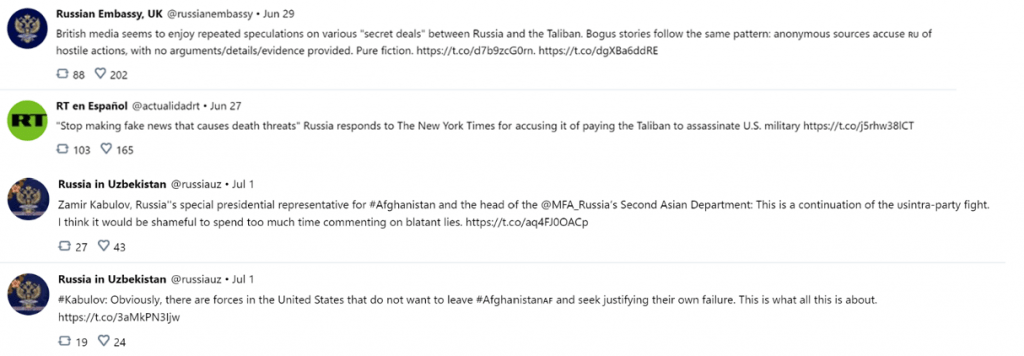
“False US reports about Russia in Afghanistan led to threats against diplomats — embassy,” TASS, June 27, 2020.
“False information about Russia and Afghanistan, published by the US media, has already led to direct threats against Russian diplomats, the Russian Embassy in Washington said on Saturday . . . According to Russian diplomats, the paper has been inventing false stories in the absence of real reasons to blame Russia. Moreover, the embassy said the authors of the article ‘obviously lack information on cooperation between Russia and US on the Afghan peace process, on Syrian, North Korean, Venezuelan, Iranian agendas.’”
“Russian embassy in UK slams reports of Russia’s ‘offer’ to Taliban as fiction,” TASS, June 29, 2020.
“Publications that emerged in British media outlets alleging that Russia offered bounties to Afghan militants to kill British soldiers is nothing but fiction aimed at heightening hysteria about the mythical ‘Russian threats’, a spokesperson for the Russian embassy in the United Kingdom told TASS.”
Both lines of argument included broader attacks on the credibility of The New York Times, which broke the story, and Western media in general. The arguments also attributed various motivations to the publication of the story they label “fake news.” These supposed motivations ranged from an effort to sabotage the Afghanistan peace process or an attempt to “disrupt” bilateral cooperation between Russia and the United States, to a push to revive “Russiagate” and undermine U.S. President Donald Trump:
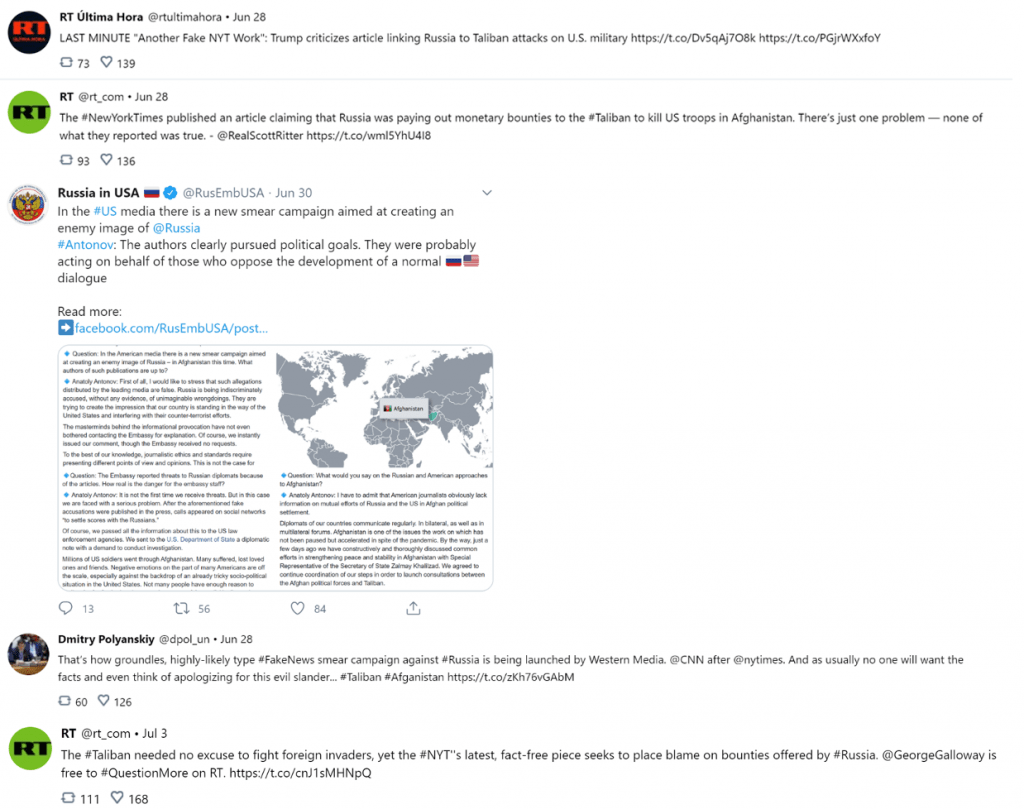
“Afghanistan Bounty Reports ‘Lie’ Aimed at Disrupting US-Russia Cooperation, Russian Envoy to US Says,” Sputnik News, June 30, 2020.
“The unsubstantiated allegations reported in the US media that Moscow offered bounties to Taliban-linked militants to assassinate US soldiers in Afghanistan are a lie aimed at disrupting cooperation between Russia and the United States, Russian Ambassador in Washington Anatoly Antonov said on Tuesday.”
“Russian Diplomat Says Reports on Moscow’s Role in Killings of US Troops in Afghanistan ‘Fake News,’” Sputnik News, June 27, 2020.
“Media reports citing US intelligence assessments alleging that Russian intelligence has solicited killings of US troops by the Taliban in Afghanistan are yet another fake news pursing to disrupt the Afghan peace process, a representative of the Russian Foreign Ministry said on Saturday.”
“Joe Biden Attacks Trump Over ‘Outrageous’ Report Russia Paid Afghan Militants to Kill US Soldiers,” Sputnik News, June 28, 2020.
“A New York Times report has claimed, citing officials with knowledge of intelligence, that Trump had known for months but ignored briefings that Russia had offered cash rewards to Afghan militants for killing US troops. Both Russia and the Taliban denied the report, and the White House said Trump had not been aware of the information. Joe Biden has slammed Donald Trump over a report that the US president failed to act on intelligence “findings” about an alleged Russian plot against US troops in Afghanistan.”
“NY Times is trying to keep Russigate[sic] alive – fmr CIA analyst,” RT America, July 1, 2020.
“After a New York Times article alleged that Russia was paying bounties to the Taliban to kill American soldiers, there’s now fallout over what the US intelligence community knew. Top lawmakers call for action while Trump calls the entire story another ‘hoax.’”
In some instances, outlets and officials alleged that The Times’ “hoax” story was planted by the CIA for propaganda purposes and attacked the U.S. intelligence community. For example:
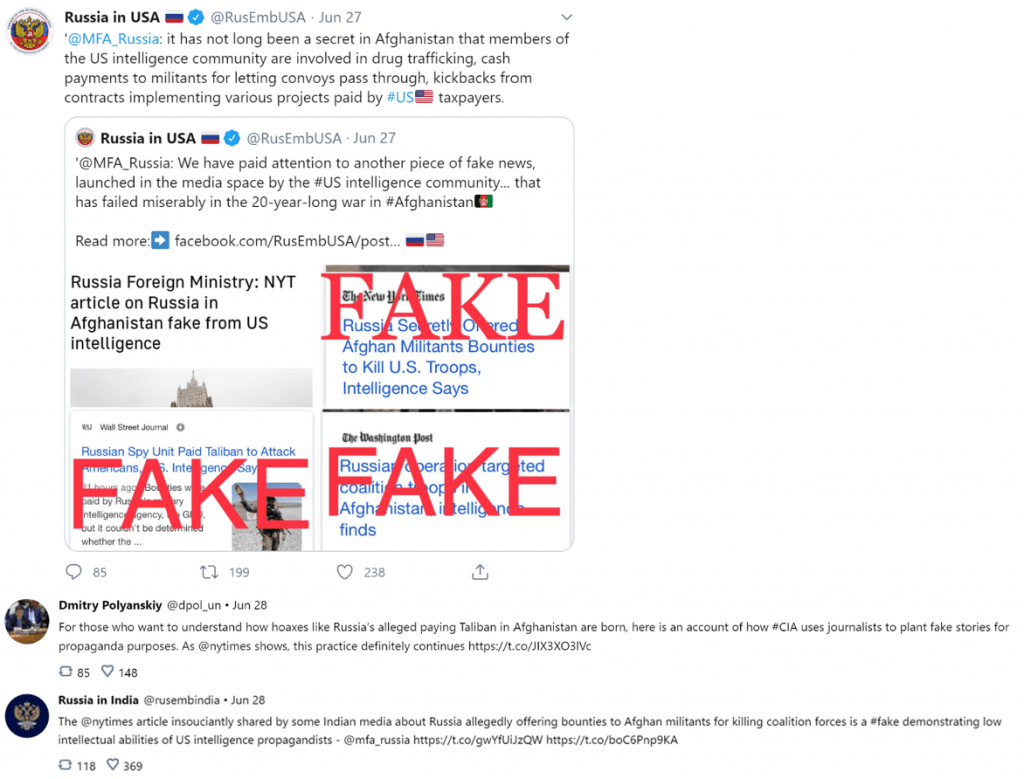
“Caitlin Johnstone: It is the US intelligence’s job to lie to you. NYT’s Afghan bounty story is CIA press release disguised as news,” Op-ed, RT, June 27, 2020.
“Whenever one sees a news headline ending in ‘US Intelligence Says’, one should always mentally replace everything that comes before it with ‘Blah blah blah we’re probably lying.’ ‘Russia Secretly Offered Afghan Militants Bounties to Kill Troops, US Intelligence Says’, blares the latest viral headline from the New York Times. NYT’s unnamed sources allege that the GRU ‘secretly offered bounties to Taliban-linked militants for killing coalition forces in Afghanistan — including targeting American troops’, and that the Trump administration has known this for months. To be clear, this is journalistic malpractice. Mainstream media outlets which publish anonymous intelligence claims with no proof are just publishing CIA press releases disguised as news. They’re just telling you to believe what sociopathic intelligence agencies want you to believe under the false guise of impartial and responsible reporting.”
RT Reacts to Latvia’s Decision to Ban It
Last week, the Latvian National Electronic Mass Media Council banned seven RT channels from being broadcast in Latvia, claiming RT is under the ultimate control of EU-sanctioned media executive Dmitry Kiselyov. Russian state-funded media have focused on the fact that RT’s editor-in-chief is Margarita Simonyan and have used the opportunity to mock Latvia, while both state media and diplomatic accounts re-upped the Kremlin’s classic claims about media censorship in democracies. Russian Foreign Ministry Spokesperson Maria Zakharova also referenced language politics/policies in Latvia, which have been controversial, and which Russia has previously accused of discriminating against Russian speakers (a claim Russia has also levied at other formerly Soviet countries):
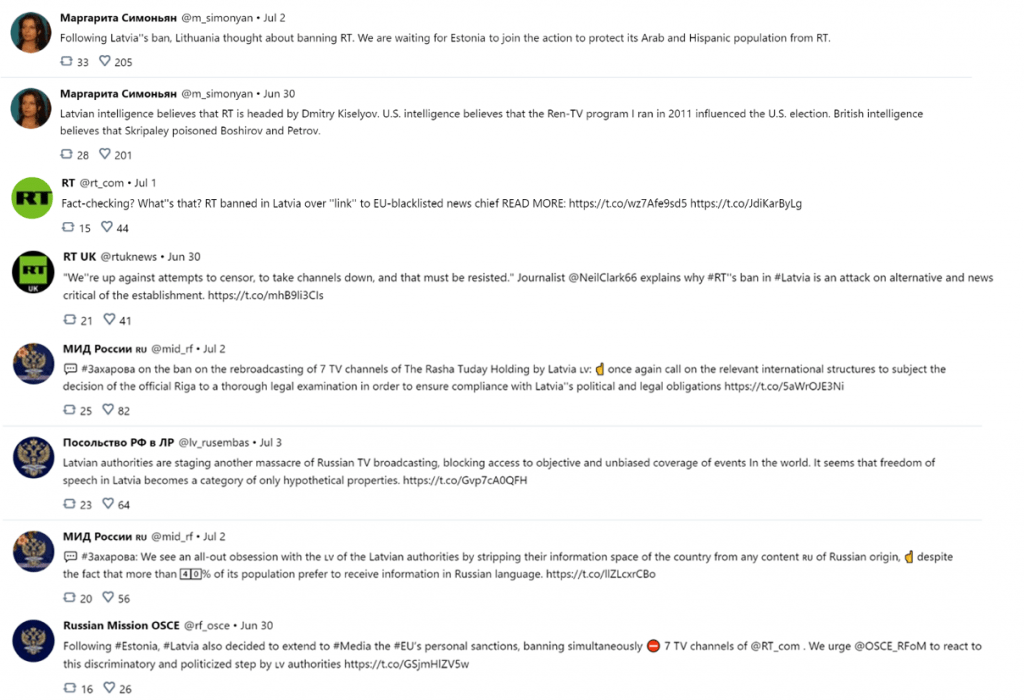
“Shambles: Latvia bans RT, saying it’s ‘controlled’ by EU-sanctioned journalist… who heads DIFFERENT outlet with similar name,” RT, June 30, 2020.
“Latvia’s media council has announced a complete ban on seven RT channels, declaring falsely that they are ‘under the effective control’ of a person subject to sanctions imposed by the European Union. The person in question is well-known Russian broadcaster Dmitry Kiselyov, who in fact heads a completely different news organization called Rossiya Segodnya — a basic fact-check that the bright sparks at Latvia’s National Electronic Media Council (NEPLP) seemingly failed to conduct.”
“Latvia’s Media Watchdog Bans Broadcasting of 7 RT Channels,” Sputnik News, June 30, 2020.
“The Latvian National Electronic Media Council (NEPLP) said Tuesday that it was banning seven RT channels, suggesting that they are owned by Dmitry Kiselev, who is under EU sanctions, although he has nothing to do with RT and is head of another media, Rossiya Segodnya international information agency.”
“Tragedy or farce? Latvia bans RT after mistaking head of network,” RT America, June 30, 2020.
“Latvia made a dramatic move to ban seven RT channels from its airways. The National Electronic Mass Media Council of Latvia claimed Dmitry Kiselev, who was being sanction by the EU, to be the head of RT. But now the NEPLP has realized their mistake, as RT is actually headed by Margarita Simonyan.”
“Latvia BANS RT: a growing tide of censorship?” RT UK, June 30, 2020.
“‘When significant numbers of people reach out for RT, the governments reach out for the repress button.’ George Galloway weighs in on the recent BANNING of SEVEN RT channels in Latvia and if the move forebodes a sweeping tide of global censorship.”
Russian state-funded media and government and diplomatic corps accounts:
Top 10 Hashtags — June 27-July 3:
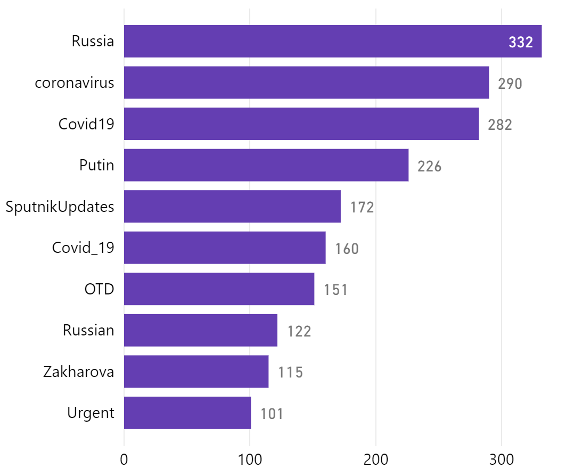
Tweets related to voting on amendments to Russia’s constitution mainly provided basic information about the results. Close to three-quarters of the approximately 860 tweets mentioning “constitution” or “конституция” came from government accounts, including updates from some embassies about Russian diaspora voting. Some tweets characterized the public’s support for the amendments as a show of democratic support for Putin:
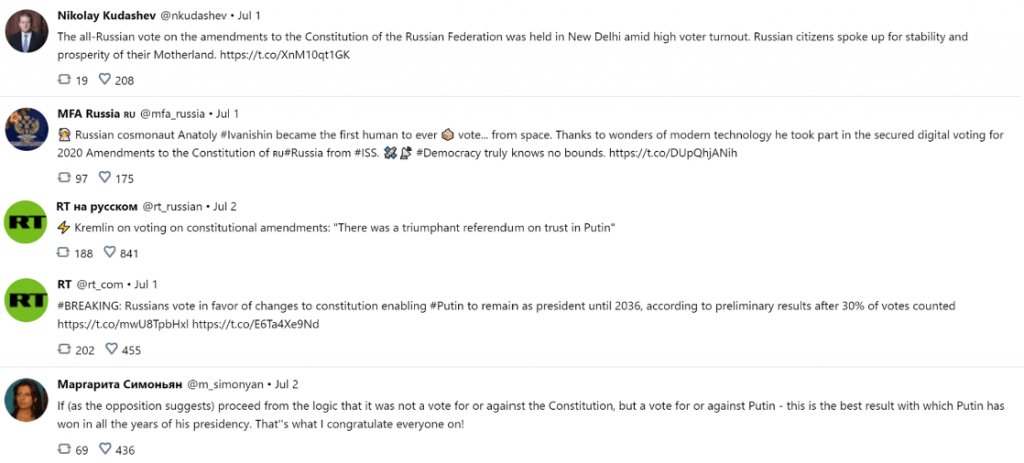
The Russian embassy in Canada did, however, highlight alleged attempts to hack Russia’s elections website, attributing them to Western efforts to undermine the vote:
Websites
Russian state-funded media websites continued a pattern of highlighting aggressive geopolitical rhetoric and actions from Iran (something we have seen previously related to sanctions and the coronavirus and naval conflicts in the Persian Gulf, as well as in previous developments in the killing of Iranian General Qasem Soleimani):
“Iran issues arrest warrant for Trump over Soleimani killing, will ask Interpol to act – local media,” RT, June 29, 2020.
“Iran has identified 36 people involved in the US assassination of General Qassem Soleimani and will seek their arrest through Interpol channels, media reports said. The list of suspects is topped by President Donald Trump. The names of the suspects in the high-profile murder of Iran’s elite Quds Force commander have been relayed to Interpol by Tehran’s chief prosecutor Ali Alghasi-Mehr, Iranian media said on Monday. The official called the killing a ‘murder’ and a ‘terrorist act.’”
“Look Who’s Talking: Iran Responds After Pompeo Calls Tehran ‘World’s Most Heinous Terrorist Regime,’” Sputnik News, July 1, 2020.
“ . . . The US is in ‘no legal or moral position to define the examples of terrorism, and no global authority has entitled the US government to do so either,’ Iranian government spokesman Alli Rabiee has announced. Commenting on Secretary of State Mike Pompeo’s statement about Tehran being ‘the world’s most heinous terrorist regime’ during Tuesday’s Security Council meeting on the Iran arms embargo, Rabiee stressed that the Islamic Republic has played a key role in the war on terrorism in the Middle East, and has paid a ‘heavy price in this battle.’ He added that the US’s own behaviour, including the January assassination of Quds force commander Qasem Soleimani, points to Washington’s ‘terrorist’ nature.”
Most notably in coverage of the U.S. presidential campaign, RT published an op-ed claiming that Biden’s supporters will rig the election:
“Wayne Dupree: The Democrats will use fraud to win this fall’s presidential election, and Trump may have to call on the military,” Op-ed, RT, July 3, 2020.
“Biden’s supporters are manipulating the polls and planning to cheat on mail-in ballots and use other dirty tricks to seize victory. These are perilous times in America – so will the troops back the President’s call if it comes? If the United States mainstream media will blatantly lie in their ink and broadcasts day after day to smear President Trump, skewing an election poll to achieve the same effect is a no-brainer.”
Coverage of Russia’s constitutional amendment vote on websites was similar to related content on Twitter, generally highlighting the basic results and characterizing it as a win for Putin. Some Russian officials also commented on criticism from other countries about the amendments, characterizing the decision as a solely domestic affair. For example:
“Russian diplomat urges US to refrain from interfering in domestic affairs of others,” TASS, July 2, 2020.
“The United States needs to refrain from interfering in the domestic affairs of other countries, Russian Foreign Ministry Spokeswoman Maria Zakharova told the YouTube channel Soloviev LIVE. ‘First, don’t interfere in the domestic affairs of other countries. Second, every state has the right to pursue its own domestic and foreign policies. And third, if you do interfere, then what goes around comes around,’ she said, commenting on US Department of State Spokesperson Morgan Ortagus’ statement about Washington’s concern with reports of possible irregularities in Russia’s constitutional vote.”
“No plans to take into account other countries’ ‘concerns’ about amendments — Kremlin,” TASS, July 3, 2020.
“Moscow has no plans to take into account other countries’ so-called concerns about constitutional amendments approved in Russia’s nationwide vote, Presidential Spokesman Dmitry Peskov told reporters on Friday.”
YouTube
On YouTube, RT America covered infringements on the rights and privacy of Black Lives Matter protestors during the height of demonstrations:
“17,000 BLM protesters tracked by their phones in major cities,” RT America, June 29, 2020.
“A US analytics company called Mobilewalla has tracked nearly 17,000 Black Lives Matter demonstrators in a few major cities without their knowledge . . . The ACLU is filing a formal complaint against the Detroit Police Department, after officers used facial recognition technology to misidentify a suspect and wrongfully arrest him. The case is being dropped without prejudice, but it speaks to the dangers and failures of this controversial software.”
“Witnesses testify over police attacks on DC protests,” RT America, June 29, 2020.
“Just last month, President Trump and top administration officials posed for their infamous photo-op in front of St. John’s Church. Witnesses are testifying before Congress on Monday about the pepper balls and rubber bullets fired on nearby peaceful protestors.”
Meanwhile, as usual, RT put out a segment on developments in the Jeffrey Epstein case:
“FBI arrests Epstein accomplice Ghislaine Maxwell,” RT America, July 2, 2020.
“Ghislaine Maxwell, British socialite and longtime accomplice of convicted sex offender Jeffrey Epstein, has been arrested by the FBI in Bradford, New Hampshire on charges of facilitating sexual abuse of underaged girls.”
China
Ending the Pro-Democracy Movement in Hong Kong
The new national security law was at the center of last week’s communications out of the Chinese network monitored on Hamilton. On Twitter, #HongKong was the third most-used hashtag, with #NationalSecurityLaw and #HK also in the top ten. When focusing only on accounts belonging to Chinese diplomats and officials, #HongKong was actually the second most-used hashtag of last week, with #NationalSecurity also making it into the top ten.
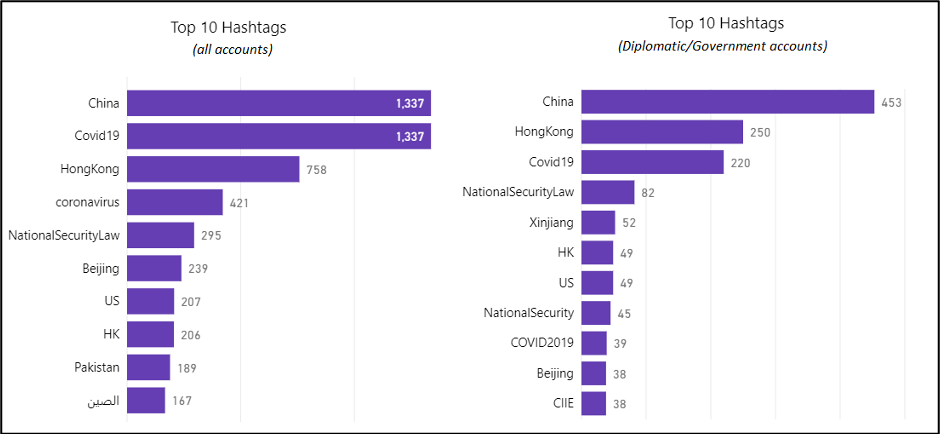
The spokesperson for the Chinese Ministry of Foreign Affairs, Hua Chunying, was quick to attack the United States’ hypocrisy and Americans’ feigned concern for Hong Kong residents. The Chinese embassies in Italy and Geneva had a similar take, warning against outside attempts to undermine China. The Chinese embassy in the United States insisted that American laws were just as draconian as Beijing’s new piece of legislation:
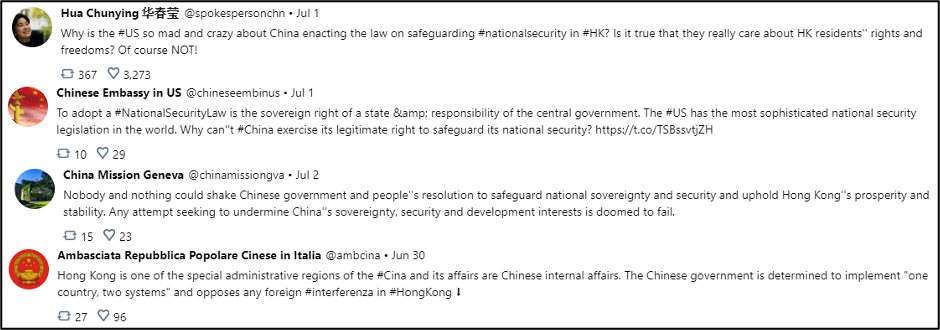
Chinese state media echoed many of these arguments. Global Times published a piece entitled “Natl security law for HK deters foreign troublemakers,” while China Daily amplified the Chinese ambassador to the United Kingdom’s denunciation of London’s stance toward the law: “China rejects UK’s stance on new law.” Via its YouTube channel, CGTN America opened a segment by implying that American attacks on the legislation were guided mostly by electoral purposes rather than by genuine concern for the city and its residents: “What’s behind the U.S. criticism of China’s HK national security law.”
A different line of argument defended the law on its merits and argued that it was a proportionate response targeting only a minority of dangerous insurgents:
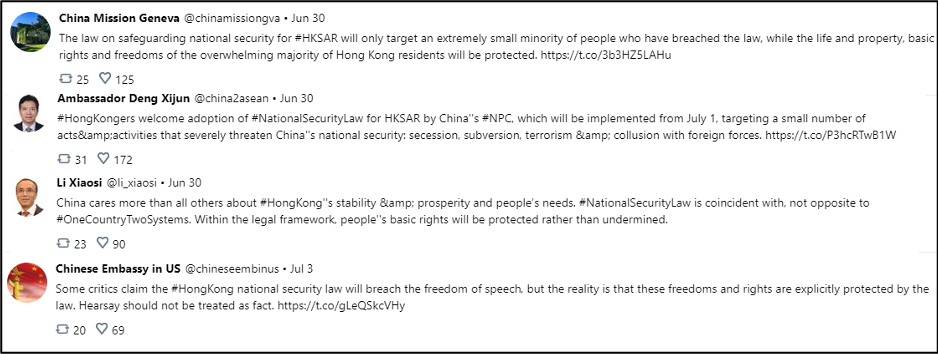
Chinese state media supported diplomats’ arguments by explaining that the law was proportionate and necessary. Xinhua quoted the ambassador to the United Kingdom as explaining that “China’s national security law for HK to target a few criminals but protect vast majority,” while CGTN quoted one of Hong Kong’s former leaders who explained that the “national security law addresses the issue of terrorism.” A video segment on CGTN America similarly stated that the law only targets secessionists and conspirators: “Who does the Hong Kong national security legislation target?”
Other accounts were defiant of the possibility that the United States might levy sanctions against Hong Kong in response to the new law:
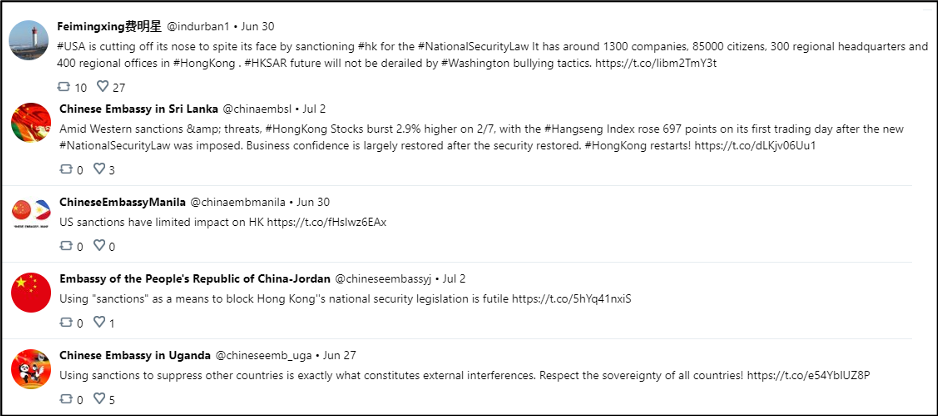
Chinese state media backed up this spirit of defiance towards Washington in pieces published by both China Daily and Xinhua: “US warned of countermeasures over sanctions on Hong Kong” and “China will retaliate if U.S. imposes sanctions over HK-related issues.”
Finally, Deputy Spokesperson of the Chinese Foreign Ministry Zhao Lijian highlighted international support for the new law:
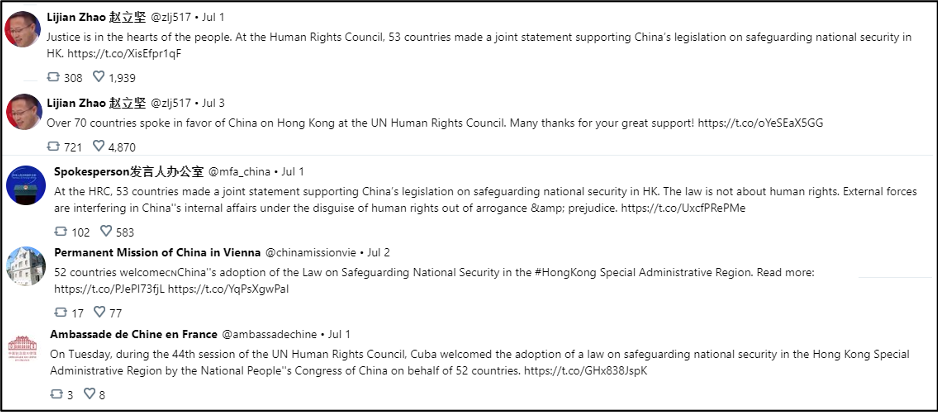
App-ocalypse in India
For the third week in a row, India featured prominently in the output of Chinese state media and government officials. With border tensions still simmering, a new point of contention last week was the Indian government’s decision to ban 59 Chinese apps from the Indian market. As a result, the number of tweets mentioning #India each day last week remained quite consistent with the previous week:

In a way, the progression in the headlines run by CGTN each day of last week told a story by themselves, with the rhetoric escalating throughout the week:
“India bans 59 mostly Chinese apps amid border crisis,” CGTN, June 30.
“India’s app-ocalyptic response,” CGTN, June 30.
“China: India’s ban on Chinese apps may violate WTO rules,” CGTN, July 1.
“China has not adopted restrictive measures against Indian products: commerce ministry,” CGTN, July 2.
“Beijing warns of India’s additional scrutiny of Chinese goods, ready to take countermeasures,” CGTN, July 3.
At the end of July 3, CGTN published a piece highlighting Chinese-Pakistani ties: “Chinese, Pakistani foreign ministers agree to jointly defend regional stability.” While the article did not mention India, the timing of a major article on China’s friendship with New Delhi’s archrival hardly seems coincidental. And, despite having been posted at the end of last week, the article about China and Pakistan’s friendship was the most shared Chinese state media story on Facebook for the week.
It is worth noting that relatively few Chinese diplomatic and government accounts tweeted about this issue, leaving state media and their employees as the main commentators on this dispute:
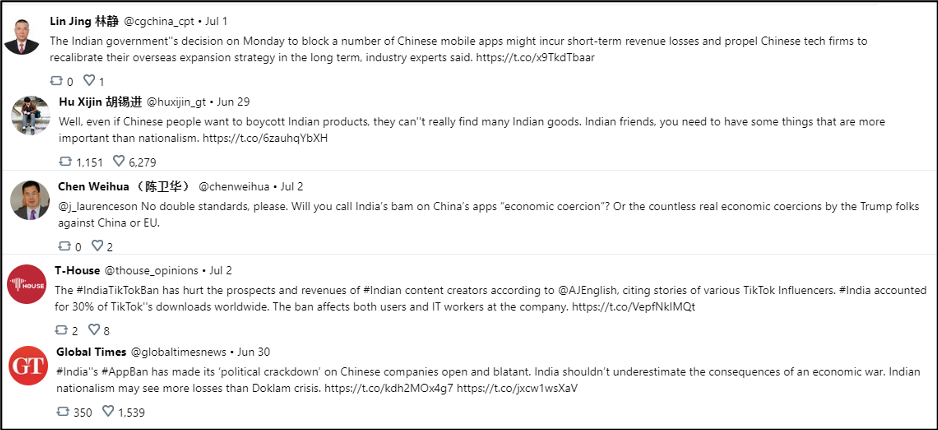
Finally, while Chinese state broadcasters did not mention the app ban in any segments last week, the few segments devoted to India painted a bleak picture of the country:

Chinese state-funded media and government and diplomatic corps accounts:
Top 10 Hashtags — June 27-July 3:
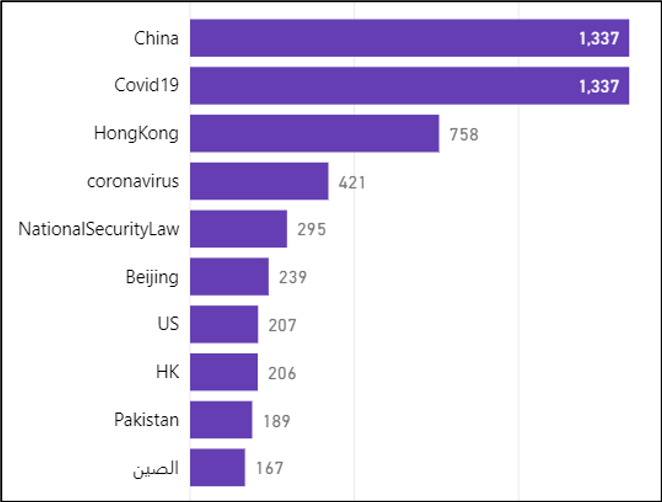
The Hamilton dashboard collected about 15,000 tweets from monitored Twitter accounts between June 27 and July 3, up 7 percent from the previous week, the first increase in over a month. In addition, #Covid19 was dethroned—or, technically, matched—by #China for the first time in months. As noted previously, Hong Kong-related hashtags were very prominent in last week’s top ten.
Besides previously mentioned stories, Chinese diplomats attacked researcher Adrian Zenz after he published a report with the Jamestown Foundation about the restrictions on Uyghurs’ reproductive rights put in place by Beijing in recent years. Unsurprisingly, the Chinese government attacked both the message and the messenger:

Websites
Chinese government-funded websites:
On Facebook, the second most-shared state media story last week relayed news of an arrest warrant Iran issued for U.S. President Donald Trump:
“Iran issues arrest warrants for Trump over killing of Soleimani: Fars news,” CGTN, June 29, 2020.
“Iran has issued an arrest warrant for U.S. President Donald Trump and 35 others over the killing of top general Qassem Soleimani and has asked Interpol for help, Tehran prosecutor Ali Alqasimehr said on Monday, according to the Fars news agency.”
In other news, China’s coverage of the coronavirus continues to strike a contrast between Beijing’s “helping hand” and Washington’s supposed malicious intentions:
“Chinese province donates medical supplies to France,” Xinhua, July 2, 2020.
“Southwest China’s Guizhou Province has donated a batch of medical supplies to Lozere in France to aid the battle against COVID-19, local authorities said.”
“Sinopharm steps up efforts in developing vaccines for COVID-19,” China Daily, July 7, 2020.
“Sinopharm Group is speeding up development of a candidate vaccine for the novel coronavirus that causes COVID-19, with more milestones having been achieved by the Chinese State-owned pharmaceutical giant ahead of hoped-for mass production.”
“US buys up world stock of remdesivir,” China Daily, July 3, 2020.
“The World Health Organization on Wednesday voiced concerns over news reports that the United States government has bought almost all the stocks of key COVID-19 drug remdesivir.”
Broadcasts
Chinese state-owned media:
On the video side of things, Chinese state media have started looking more closely at the U.S. presidential election, running several segments on Joe Biden:
“Joe Biden speaks to Asian Americans voters in online forum,” CGTN America, June 30, 2020.
The caption for the video reads: “Asian Americans are the fastest growing racial or ethnic group in the United States. As their numbers grow, so does their voice in U.S. politics.” The segment revisits Donald Trump’s “Kung Flu” comment on June 20.
“Biden is not going to hold campaign rallies,” CGTN America, June 29, 2020.
“Presumptive Democratic presidential candidate Joe Biden announced Tuesday that he will not hold campaign rallies due to concerns over the coronavirus pandemic.”
Also concerning the United States, CGTN America continues to cover the anti-racism debates and conversations taking place in the country:
“Philosophy Professor on the debate over African American reparations,” CGTN America, June 27, 2020.
“Even if something like [reparations] does happen, does it really erase centuries of injustice, centuries of discrimination?”
“What’s changed one month after George Floyd’s death?” CGTN America, June 28, 2020.
“A lot has transpired since George Floyd was killed but protesters here say so much more still needs to happen.”
“Future of policing under scrutiny in the U.S.,” CGTN America, July 1, 2020.
The segment opens with a crowd chanting “Go home, racists, go home!” at pro-police demonstrators, some of which are carrying automatic weapons. CGTN then explains that “emotions soon boil over” and shows some demonstrator yelling at each other.
Iran
Focus on American Injustice at Home and Abroad
As is often the case, a substantial share of Iranian content focused on casting the United States as a hopelessly unjust society in which the powerful prey on the powerless and the rule of law serves only to entrench the privileged. Compared with recent weeks, Supreme Leader Ayatollah Khamenei himself took on a particularly active role in pushing these stories, both in English and Spanish:


An interwoven narrative focused specifically on instances of perceived American lawlessness or injustice on the international stage. This thread incorporated the hashtag #AmericanHumanRightsWeek, which Iranian-backed media outlets, and the Ministry of Foreign Affairs in particular, used to paint American and European concern for human rights as a self-interested ploy:
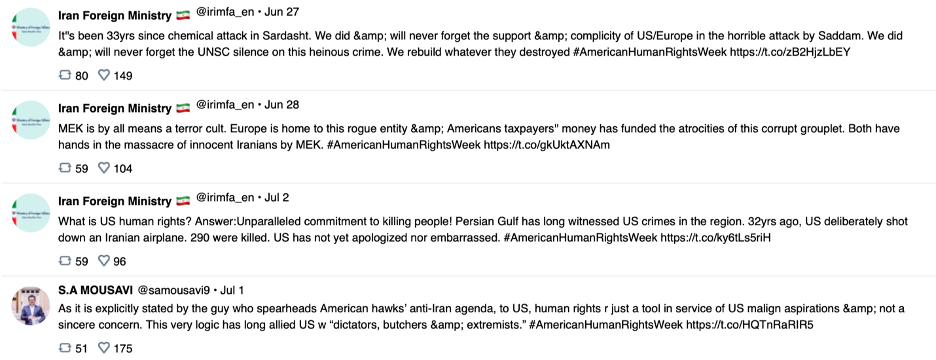
This narrative was pushed by many Iranian embassies around the world; although, most of the content generated very little engagement:
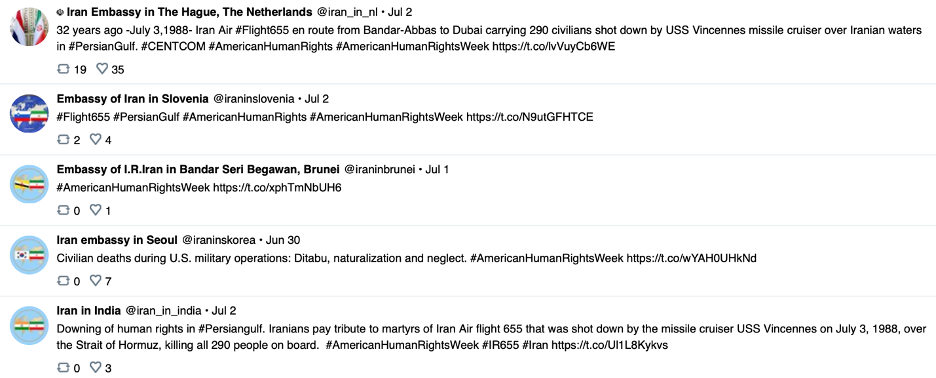
In a few cases, the narratives of domestic and international injustice were very explicitly linked:


Sharp Criticism of U.S. Allies, Especially Israel
After Iran and the United States, Israel was the third most frequently mentioned country in Iranian-backed media last week. Criticism of Israel was particularly dominant on HispanTV, Iran’s Spanish-language outlet:
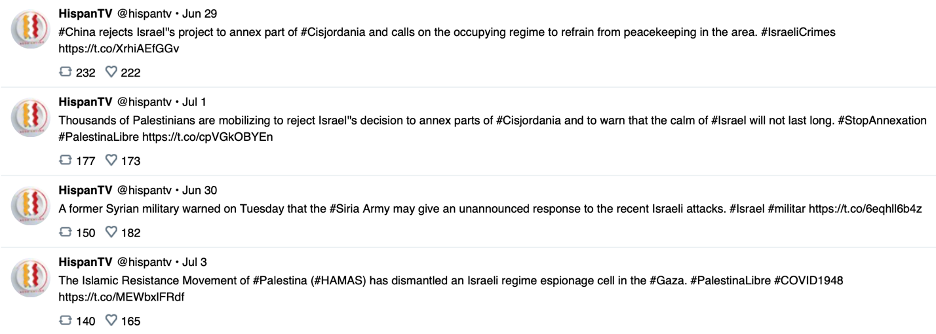
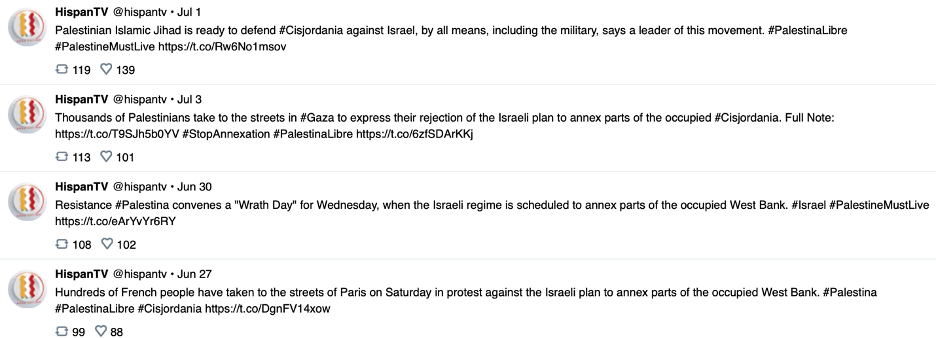

A wide range of Iranian outlets also criticized American and British efforts to encourage other countries to reapply sanctions on Iran. Other nations were also praised or criticized for recent positions opposing or supporting the re-imposition of sanctions. Most of this content generated relatively little engagement:
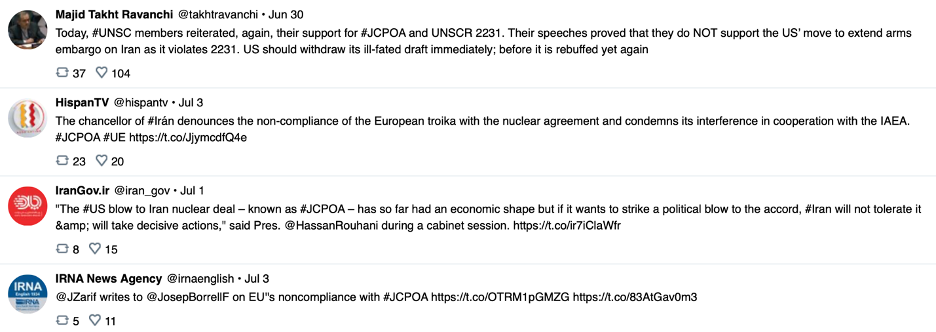
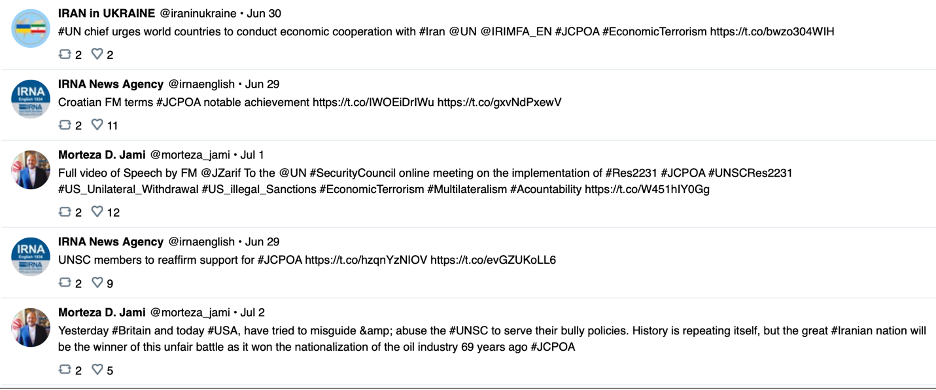
Praise for Russia and China
As usual, Iranian media sought to cast Iran as a key player among the United States’ global adversaries, this week emphasizing its partnership with China:

Compared with recent weeks, though, relatively fewer stories focused on Iranian cooperation with Russia and China, with many simply focusing on Russian strength and perceived American weakness:
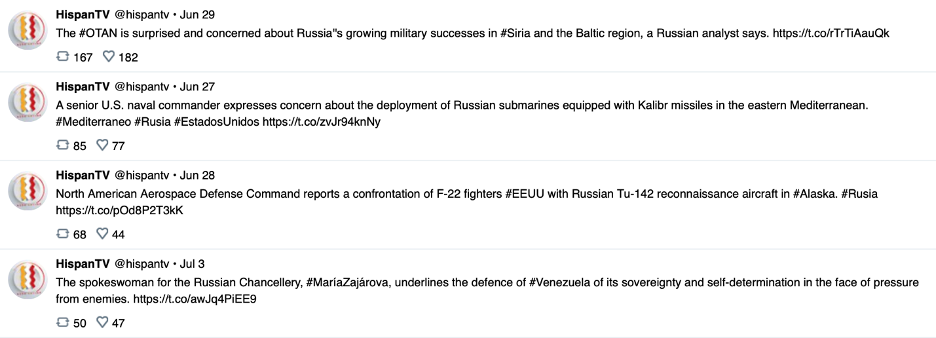


Iranian state-funded media and government and diplomatic corps accounts:
Top 10 Hashtags — June 27-July 3:
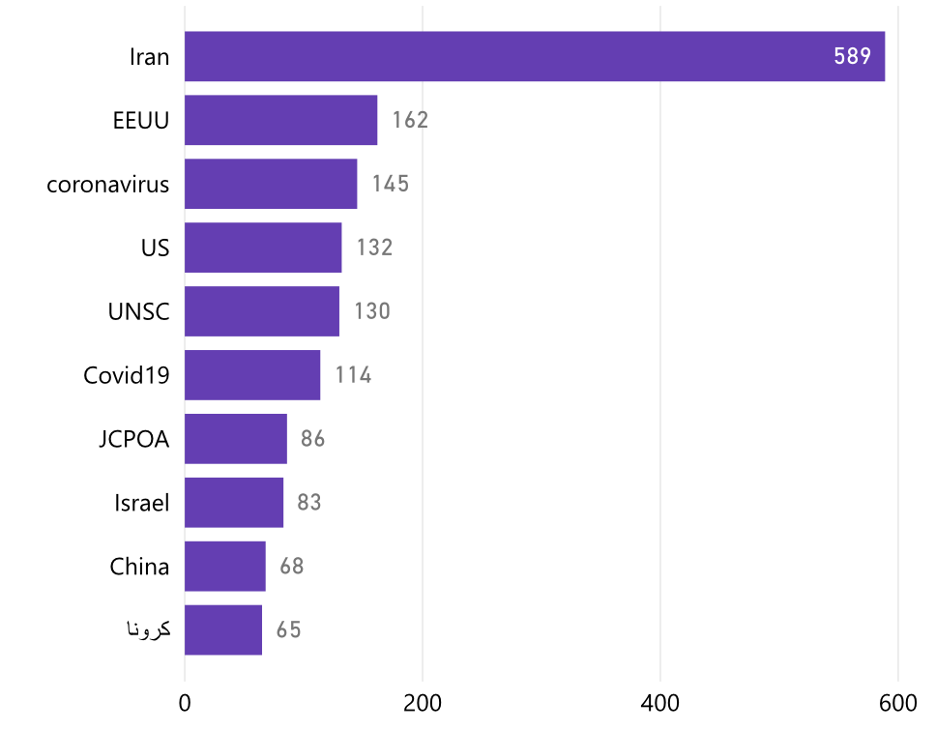
This week, the top ten hashtags from Iranian state-backed media and diplomatic Twitter accounts reflect the particular focuses on the Iran nuclear agreement and the UN Security Council conversations surrounding it.
More strikingly, eight of the top ten most-liked tweets came from the Ayatollah himself, with the other two coming from Mohammad-Javad Azari Jahromi, Iran’s Minister of Information and Communications Technology. Khamenei’s tweets covered a wide range of subjects, including mask-wearing, the Iranian judicial system, and U.S. politics and culture:
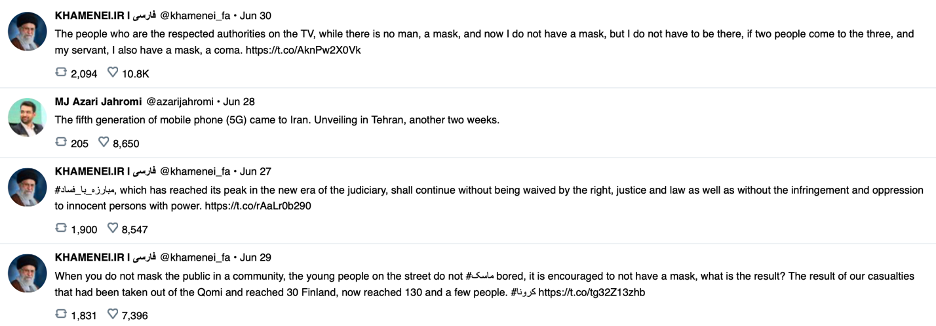
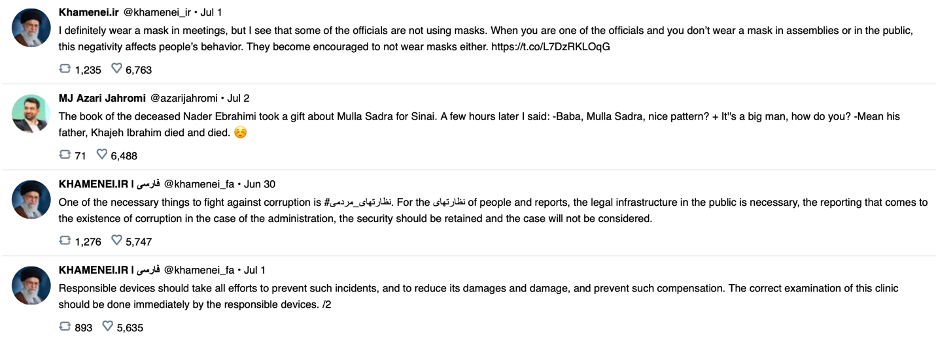

Websites
Iranian government-funded websites:
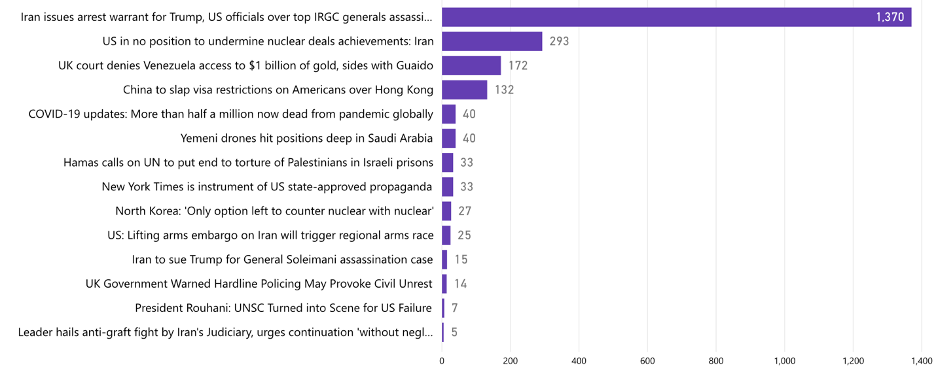
The most engaged-with story on Facebook last week from Iran-backed media was a PressTV story announcing an arrest warrant for Donald Trump issued by Iran over the assassination of Qassem Soleimani:
“Iran issues arrest warrant for Trump over General Soleimani’s assassination,” PressTV, June 30, 2020.
“Iran has issued an arrest warrant and asked Interpol for help in detaining US President Donald Trump and several other US military and political leaders who were behind a January drone attack assassinating Lieutenant General Qassem Soleimani.”
“US in no position to undermine nuclear deal’s achievements: Iran,” PressTV, June 29, 2020.
“Iran says the United States has forfeited all rights to bring the 2015 Iran nuclear deal’s achievements into doubt, urging Washington and its European allies against trying to damage the agreement any further.”
The views expressed in GMF publications and commentary are the views of the author alone.

